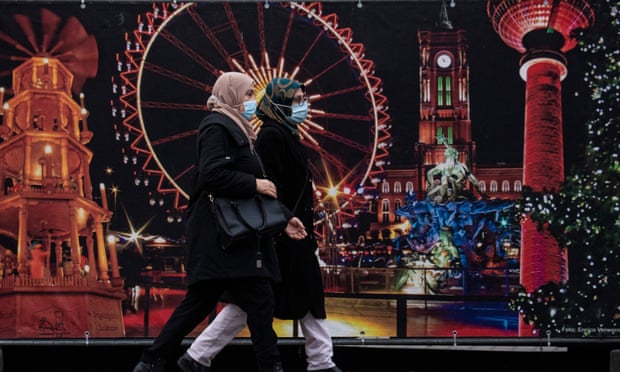Researchers said results highlight the need to continue with face coverings, social distancing and handwashing alongside vaccine programmes.
Mask-wearing is the single most effective public health measure at tackling Covid, reducing incidence by 53%, the first global study of its kind shows.
Vaccines are safe and effective and saving lives around the world. But most do not confer 100% protection, most countries have not vaccinated everyone, and it is not yet known if jabs will prevent future transmission of emerging coronavirus variants.
Globally, Covid cases exceeded 250 million this month. The virus is still infecting 50 million people worldwide every 90 days due to the highly transmissible Delta variant, with thousands dying each day.
Now a systematic review and meta analysis of non-pharmaceutical interventions has found for the first time that mask wearing, social distancing and handwashing are all effective measures at curbing cases – with mask wearing the most effective.
They said the results highlight the need to continue mask wearing, social distancing and handwashing alongside vaccine programmes.
Researchers at Monash University and the University of Edinburgh say multi-faceted measures, such as lockdowns and closures of borders, schools and workplaces need further analysis to assess their potential negative effects on populations.
Public health or non-pharmaceutical interventions are known to be beneficial in fighting respiratory infections like flu, and countries around the world have tried using them to curb the spread of Covid.
However, until now, reviews have not been robust enough to allow experts to make firm conclusions about the effectiveness of such measures in tackling Covid.
Results from more than 30 studies from around the world were analysed in detail, showing a statistically significant 53% reduction in the incidence of Covid with mask wearing and a 25% reduction with physical distancing.
Handwashing also indicated a substantial 53% reduction in Covid incidence, although this was not statistically significant after adjusting for the small number of handwashing studies included.
Detailed analysis was not possible for other measures, including quarantine and isolation, universal lockdowns, and closures of borders, schools, and workplaces, due to differences in study design, outcome measures and quality, the researchers said.
Mask wearing was adopted by many countries at the start of the pandemic, but nearly two years later many have now dropped some or all their original requirements.
The Dutch government this month decided to re-impose the mandatory wearing of face masks in an effort to slow the latest spike in infections.
Romania, the Czech Republic, Slovakia and Poland have also recently tightened rules on mask wearing. But Hungary, which has seen a sharp rise in cases this month, has resisted making mask wearing mandatory in closed spaces.
In England, the legal requirement to wear a mask ended in July, apart from in healthcare settings and care homes, unless exempt. In Wales, they are still legally required on public transport and in all public indoor areas apart from pubs and restaurants. In Scotland, masks must still be worn in shops and on public transport, and in pubs and restaurants when not seated. In Northern Ireland, masks must still be worn on public transport and in shops.
Boris Johnson, the UK prime minister came under fire this month from the World Health Organization’s special envoy for Covid after being photographed without a face covering during a hospital visit.
Asked about pictures of Johnson walking maskless through Hexham General, Dr David Nabarro told Sky News: “I’m not sitting on the fence on this one – where you’ve got large amounts of virus being transmitted, everybody should do everything to avoid either getting the virus or inadvertently passing it on.
“We know that wearing a face mask reduces the risk, we know that maintaining physical distance reduces the risk, we know that hygiene by regular handwashing and coughing into your elbow reduces the risk. We should do it all and we should not rely on any one intervention like vaccination on its own.”

